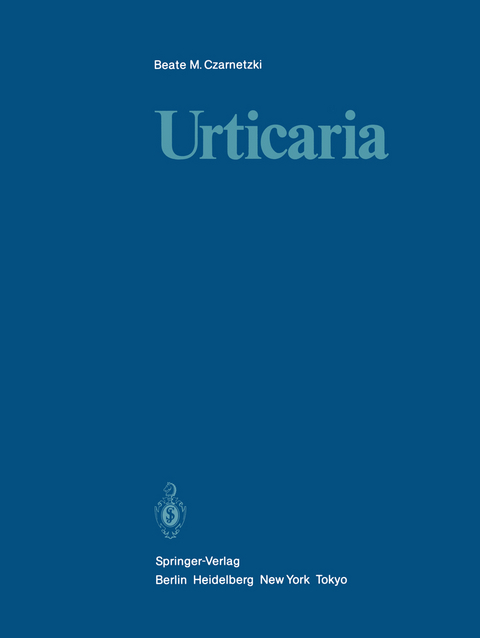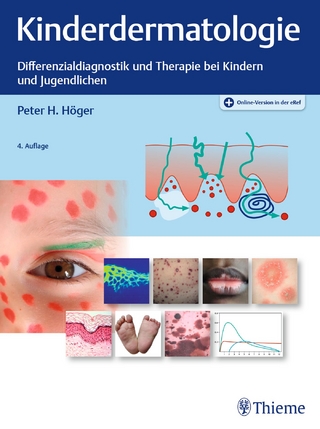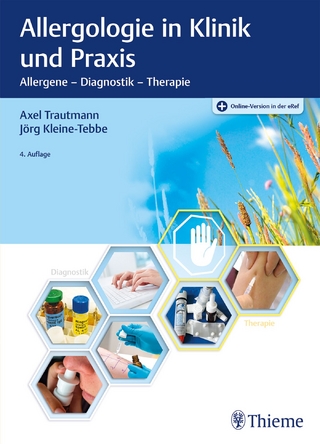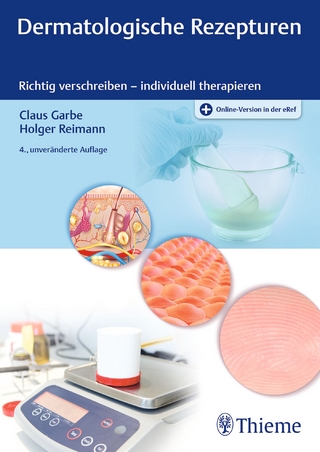
Urticaria
Springer Berlin (Verlag)
978-3-642-70315-7 (ISBN)
1 History of Urticaria.- 1.1 Introduction.- 1.2 Nomenclature.- 1.3 Pathogenetic Theories.- 1.4 The Physical Urticarias.- 1.5 Urticaria Pigmentosa.- 1.6 Angio(neurotic)edema.- 1.7 Treatment.- 2 Basic Mechanisms.- 2.1 The Wheal.- 2.2 The Mast Cell.- 2.3 Mediators.- 2.4 Overview of Pathogenetic Aspects.- 3 Acute and Chronic Urticaria.- 3.1 Definition.- 3.2 Classification.- 3.3 Epidemiology.- 3.4 Clinical Aspects.- 3.5 Histopathology.- 3.6 Laboratory Findings.- 3.7 Specific Causes of Reactions.- 3.8 Diagnosis and Differential Diagnosis.- 4 Angioedema.- 4.1 General Aspects and Epidemiology.- 4.2 Classification.- 4.3 Clinical Aspects.- 4.4 Associated Diseases.- 4.5 Course and Prognosis.- 4.6 Histology and Ultrastructure.- 4.7 Pathogenesis.- 4.8 Laboratory Findings.- 4.9 Genetics.- 4.10 Diagnosis.- 4.11 Differential Diagnosis.- 5 The Physical Urticarias.- 5.1 General Aspects.- 5.2 Epidemiology and Clinical Aspects.- 5.3 Pathogenesis.- 5.4 Dermographic Urticaria (Urticaria Factitia).- 5.5 Vibratory Angioedema.- 5.6 Pressure Urticaria.- 5.7 Cold Urticaria.- 5.8 Cholinergic Urticaria.- 5.9 Solar Urticaria.- 5.10 Heat Contact Urticaria.- 5.11 Aquagenic Urticaria.- 6 Contact Urticaria.- 6.1 General Aspects and Classification.- 6.2 Clinical Manifestations.- 6.3 Immunologically Mediated Contact Urticaria.- 6.4 Contact Urticaria due to Histamine Liberators.- 6.5 Venom-Induced Contact Urticaria.- 6.6 Contact Urticaria due to Unknown Mechanisms.- 6.7 Pathomechanisms of Contact Urticaria.- 6.8 Diagnosis of Contact Urticaria.- 7 Anaphylactoid Reactions.- 7.1 Definition.- 7.2 Classification.- 7.3 Epidemiological Aspects.- 7.4 Agents Eliciting Anaphylactoid Reactions.- 7.5 Clinical Features.- 7.6 Diagnosis.- 7.7 Pathogenesis.- 7.8 Pathogenetic Aspects of Intolerance Reactions to Special Reagents.- 8 Urticarial Vasculitis Syndrome.- 8.1 General Aspects.- 8.2 Epidemiology.- 8.3 Clinical Aspects.- 8.4 Histopathology.- 8.5 Immunopathology.- 8.6 Laboratory Findings.- 8.7 Diagnosis.- 8.8 Differential Diagnosis.- 8.9 Prognosis.- 8.10 Pathogenesis.- 9 Mastocytosis (Urticaria Pigmentosa).- 9.1 Introduction.- 9.2 Cutaneous Mastocytosis.- 9.3 Systemic Mastocytosis.- 9.4 Symptomatology.- 9.5 Histology.- 9.6 Laboratory Findings.- 9.7 Diagnosis.- 9.8 Pathogenesis.- 9.9 Prognosis.- 10 Diagnosis.- 10.1 Introduction.- 10.2 History.- 10.3 Laboratory Procedures.- 10.4 Diagnosis by Avoidance.- 10.5 Diagnosis by Therapy.- 11 Therapy.- 11.1 Basic Therapeutic Considerations.- 11.2 Specific Therapeutic Modalities.- 11.3 Treatment of Acute and Chronic Urticaria.- 11.4 The Physical Urticarias.- 11.5 Mastocytosis.- 11.6 Urticarial Vasculitis Syndrome.- 11.7 Hereditary Angioedema.- References.
| Erscheint lt. Verlag | 18.11.2011 |
|---|---|
| Zusatzinfo | XI, 189 p. |
| Verlagsort | Berlin |
| Sprache | englisch |
| Maße | 210 x 280 mm |
| Gewicht | 511 g |
| Themenwelt | Medizin / Pharmazie ► Medizinische Fachgebiete ► Dermatologie |
| Medizin / Pharmazie ► Medizinische Fachgebiete ► Pharmakologie / Pharmakotherapie | |
| Schlagworte | allergy • Pruritus • Research • urticaria • Urtikaria |
| ISBN-10 | 3-642-70315-1 / 3642703151 |
| ISBN-13 | 978-3-642-70315-7 / 9783642703157 |
| Zustand | Neuware |
| Haben Sie eine Frage zum Produkt? |
aus dem Bereich


